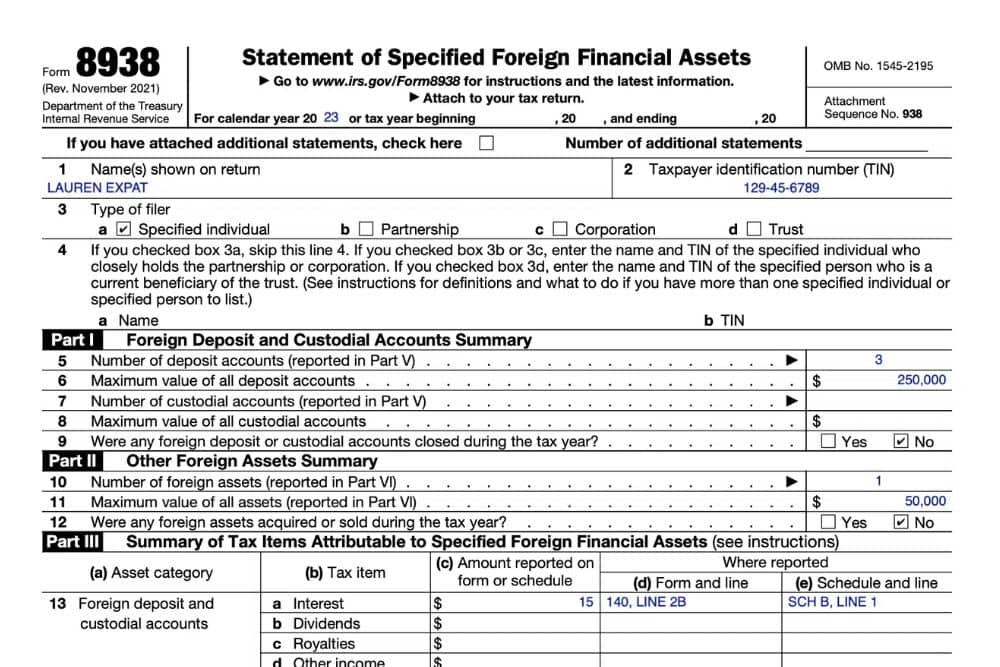What’s the Gift Tax Exclusion? A Guide for US Expats
December 1, 2022 | Tax Forms | 6 minute read
Expat Tax Blog. Tax Tips for US Americans abroad.
Updated January 14, 2025
 All blogs are verified by Enrolled Agents and CPAs
All blogs are verified by Enrolled Agents and CPAs
Updated January 14, 2025

What is the Gift Tax?
Have you heard of the gift tax before? If not, have you heard of Form 709? The federal gift tax was enacted in 1924 before receiving a facelift and being reintroduced in the early 1930s. While the gift tax has amassed billions in revenue for the IRS, it was introduced not as a means of income for the government but as a protective measure. It was to help minimize estate and income tax avoidance. The good news is you can use the Gift Tax Exclusion in 2025 when you receive a gift from a US citizen or foreign person.
The current lifetime exemption is $12.06 million. This is the amount you can give away over your lifetime without paying the federal gift tax. We want to note that Form 709 is unique compared to other forms. With the gift tax, only the donor is subject to taxation, not the person receiving the gift.
How Much is the Gift Tax Exclusion Cap in 2025?
- $18,000 for individuals in 2024; for 2024, it will be raised to $19,000
Gift Splitting: if you are married with two children, your partner and you may jointly gift each child up to $32,000 without exceeding the limit. Remember that this is only allowed when you and your spouse file together.
Gift Tax vs. Estate Tax
Generally speaking, gift tax and estate tax are coupled together. The most significant difference is that the estate tax applies only to transfers of the deceased property; the gift tax applies to transfers made before the donees passing.
Quick facts:
- Upon death, the donee’s assets become the property of their estate. Including but not limited to physical property, stocks, artwork, and jewelry
- If the value of the deceased’s gross estate exceeds $11.8 (2024), then the estate executor must file a federal estate tax return, even if no amount is owed.
- An estate tax return is due within nine months of the deceased passing. A six-month extension may be filed in the first year.
Who Files the Gift Tax Exclusion Form?
If you have recently received a financial gift (yay you!) from someone in your life, it is essential to understand your tax responsibilities, if any.
As a US citizen using the gift tax remember the person sending the gift, also known as the donee, is responsible for paying any gift taxes owned. This includes contributions including but not limited to: property, checks, and other assets.
In short, the donee must file Form 709 to report any and all gifts exceeding $18,000 annually (2024). In exceptional circumstances, you may agree to pay the gift tax as the recipient. This will require you to consult with a Tax Professional.
How does the IRS know if I give a gift?
If you are considering trying to get around paying potential tax on a gift you have sent, we strongly urge you against it.
The first way the IRS would discover you have sent a gift is through you filing Form 709; however, if you fail to file the form, you may be eligible for an audit. Remember that banks are required to report any cash transfers exceeding $10,000!
Penalties for Failing to Report
If you failed to file Form 709, even if no gift tax was due to pay, the IRS could still serve you with a penalty. The current penalty is five percent of the gift’s value for each month the gift is not reported, capped at 25%.
Can I Deduct Gifts From My Income Tax Return?
Only if you have donated money to deductible charitable organizations for their use.
What is Not Subject to the Gift Tax Exclusion?
- Any amount under the annual exclusion (see above).
- Tuition or other educational exclusions
- Medical expenses on the recipient’s behalf
- Gifts to US citizen spouses*
- Gifts to a political organization
- Donations to qualifying charities are deductible on your tax return
*Gifts to Non-Resident Alien Spouses have a higher exclusion than the annual $18,000, but not the unlimited exclusion like for US Citizen Spouses. For 2025 , the NRA Spouse Annual Gift exemption is $185,000.
What is Subject to the Gift Tax?
| Gifts That are Subject to Gift Taxes |
|---|
| Loans over $10,000 at less than the market rate of interest |
| Making a payment owed by someone else |
| Sending a gift as an individual to a corporation |
| Checks: here, it is essential to note that the check is effective on the date the donor gives the check to the donee. To avoid estate taxes, the donor must also be alive when the bank pays the check out to the donee. |
| Adding a joint tenant to real estate |
| Gift of foreign real estate from a US citizen |
| Gifting tangible property/real estate in the US |
| Down payment gift to help an adult child purchase a home |
| Cash gifts to assist in paying for education |
| Money is deposited into 529 college savings account from a donor other than the parents. |
Gifts to Minors
Minors can receive $15,000 annually as a financial gift. Additionally, it will not count towards your lifetime cap of $12.06 million. Gifts to minors are considered:
- gifts made directly to the minor and
- through a custodial account
If you are gifting money into a custodial account, please remember that the minor must receive the total funds at maturity (18 or 21, based on your state law) without fail.
Child support payments for minors are also not considered gifts if they are under legal obligation.
How Can I report and Pay the Gift Tax?
If you have sent a gift or are planning on sending one in the future, you must report the gift on time and in the proper manner. You are urged only to file one Form 709 per year. You will need to:
- Determine if you are required to file Form 709 (check what is subject to gift tax)
- Decide which gifts you must report
- Fill out Form 709 either online through MyExpatTaxes or on paper and then mail the form to the IRS
- Sign and date the return
Any US citizen can file Form 709 on their annual return between January 1st through April 15th, the year after the gift was made. Please note that if April 15th falls on a holiday or weekend, it may be filed the following business day.
If extending your income tax report, Form 709 will automatically file suit.
Tax Saving Tips for Holiday Donations
Do you donate money during the holidays? There are a couple of things to remember when making a charitable donation to help keep your tax return as simple as possible.
- Donate Goods: donations to tax-exempt charities are an excellent source of tax deductions. If you donate children’s toys or other goods to a charity shop, you can deduct the fair market value on your tax return if you can claim itemized deductions. Remember that you will need to share the amount initially paid for the items; for deductions of $250 or more, the charitable organization will need to give you a statement of the amount of money contributed.
- Save those receipts! You must keep an official bank record from a debit or credit card donation, such as a charity’s name. You may also use a receipt from the charity.
- Are you volunteering? Time to keep track of your mileage! While you may not be able to receive a deduction for the time you spent working for a charity, you can for those miles you spent driving.
And remember, only donations to eligible (mainly US charities) are deductible on a US tax return.
Do you need some extra help with figuring out Form 709 this year? Let MyExpatTaxes help! We can help ensure you are filing correctly and promptly.

Written by Nathalie Goldstein, EA
Nathalie Goldstein, EA is a leading expert on US taxes for Americans living abroad and CEO and Co-Founder of MyExpatTaxes. She contributes to Forbes and has been featured in Forbes, CNBC and Yahoo Finance discussing US expat tax.
December 1, 2022 | Tax Forms | 6 minute read







